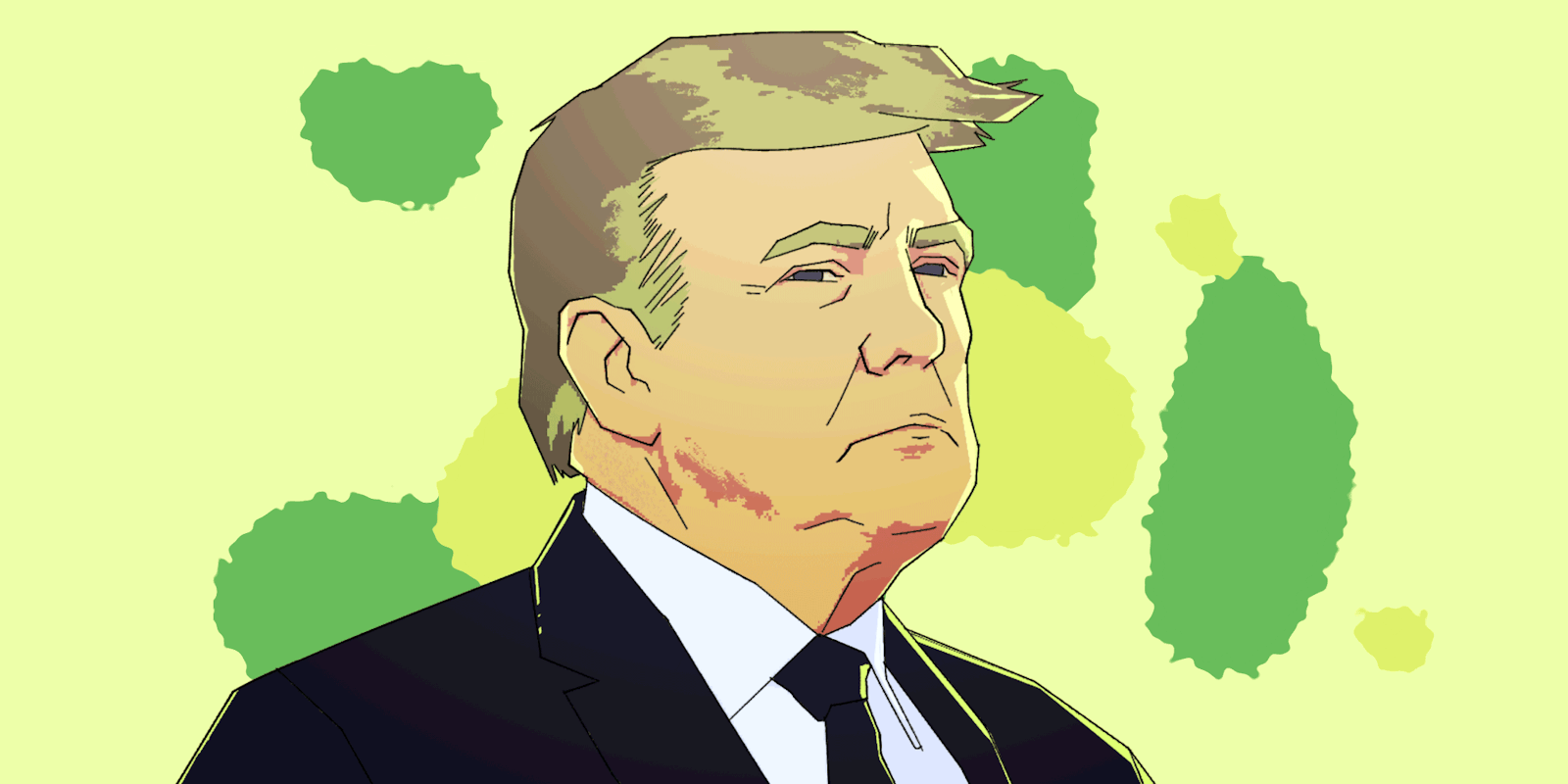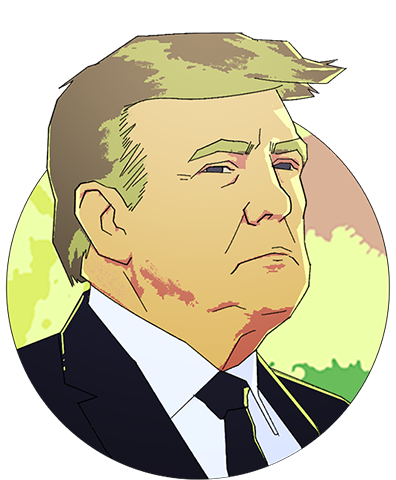Take a trip down another rabbit hole — Click a face for more stories
In the waning days of his presidency, Donald Trump declared an all-out war on the internet—and if he had gotten his wish, he would have burned down not just the internet as we know it, but the hive of disinformation and his fervent popularity that came along with it.
While unsubstantiated claims about the 2020 election were at the top of his mind following his loss to President-elect Joe Biden, repealing Section 230 of the Communications Decency Act may have been second on his list of gripes.
Trump wanted a repeal of the law added into a military spending bill, and once that failed, Senate Majority Leader Mitch McConnell (R-Ky.) tried to inject a 230 repeal into the debate over $2,000 coronavirus relief checks. While neither of those outcomes occurred, it’s clear Trump’s incessant attacks on the law has made it a fixture in Washington, D.C.
Section 230 shields websites from being held liable over posts made on them by their users. It’s an important internet law that has been hailed as a bedrock of the modern internet. Experts warn that changes to it could have widespread ramifications online.
The law also gives websites the leeway to moderate content on their platforms. As Sen. Ron Wyden (D-Ore.), one of the authors of the law, puts it: Section 230 gives websites a “sword and a shield.”
The ramifications of losing the protections afforded by Section 230 could come in a number of ways, but the most likely scenarios of a repeal play out in two ways. One, most user-generated, content-based websites might decide it’s not financially possible to be potentially held liable over every post someone might make and shut down. Two, a handful of powerful websites would become even more entrenched since they would have the financial ability to handle the possible deluge of content they would suddenly be liable for.
The law shields all websites, from large companies like Twitter and Facebook, to small blogs and message boards like The_Donald that became a hub of Trump’s online supporters.
While Trump will not be in office to watch any potential changes to Section 230, he has paved the way toward making a once fairly obscure and wonky—yet vitally important—law the epicenter of tech policy in D.C. Even Biden and some of his incoming administration officials have joined members of Congress in criticizing the law. Trump opened a Pandora’s Box that isn’t going away anytime soon.
If his Section 230 crusade is his tech legacy, will Trump’s attacks on the law end up destroying the internet?
While Trump has made Section 230 a mainstream talking point, experts say there seems to be a lack of clarity on what the law actually is and what it does.
Section 230 specifically says: “No provider or user of an interactive computer service shall be treated as the publisher or speaker of any information provided by another information content provider.”
This protection allows websites to host content uploaded by users without fear of being held liable for what that content says. But the debate over Section 230 has spawned misinformation about what it does.
Trump and his supporters have decided that repealing the law is a way to punish “Big Tech” for an alleged bias against conservatives in their moderation practices. Meanwhile, some on the left have said Section 230 is the reason misinformation has flourished online.
Neither of those things are true.
“Everyone’s angry at the largest platforms for different reasons. Some people say they do too much moderation, some people are saying they’re not doing enough moderation of harmful content,” Jeff Kosseff, an assistant professor of cybersecurity law in the U.S. Naval Academy’s Cyber Science Department and author of The Twenty-Six Words That Created the Internet told the Daily Dot. “When you look at both of their arguments, they have valid points. The problem is that they focus, laser-like, on Section 230 as the solution to the problem when in fact, it’s often not going to be their solution. For the people who think there’s too much moderation, getting rid of Section 230 isn’t going to solve their problems because then you’re going to have even more moderation. The people who think there is not enough moderation, getting rid of if might result in more moderation but it might not necessarily be the most effective type of moderation you can get.”
Repealing the law wouldn’t solve gripes about anti-conservative bias on social media, but could very well lead to more moderation—the very thing they don’t want. Not only that, the repeal would have an impact on all the spaces online that helped launch Trump to the presidency, along with other sites with user-generated content.
Meanwhile, Elliot Harmon, a senior activist at the Electronic Frontier Foundation, criticized the notion that Section 230 is the reason for misinformation online.
“If there is indeed unlawful speech there in the form of certain types of threats, or things covered by state or federal criminal law, then you’re talking about a failure of law enforcement. On the other hand, if you’re talking about things that are not illegal that are just constitutionally protected lies, it’s not Section 230 that allows those lies, it’s the First Amendment to the Constitution,” Harmon said.
Trump himself has benefited from this law countless times as he used social media as a megaphone (until eventually being kicked off the platforms following the Capitol riot) for his conspiratorial musings during his presidency.
The law worked in his favor in May—and earlier during his time in office—when Trump tweeted about a conspiracy theory that MSNBC host Joe Scarborough was somehow involved in the death of an intern while he was a lawmaker in 2001.
Without Section 230 protections, it’s quite possible that Trump’s tweet (or any tweet that is potentially libelous) wouldn’t have been allowed to be posted, as Twitter would be exposed to legal action because Trump posted the claims on the platform.
The focus of the Section 230 debate has been on large tech giants like Twitter and Facebook, but the ramifications of Trump’s burning desire to “repeal” the law would stretch all the way down to his most fervent supporters online.
Trump’s presidency has in many ways been defined by his online supporters, and repealing or changing Section 230 would affect them—just like everyone else online.
“When I’m talking to more right-wing people about this ‘neutral public forum’ concept—either the idea that Section 230 somehow requires it or that it should be amended to require it, as Josh Hawley and others have proposed—one of the examples I will always point to is The_Donald, the message board that is explicitly only for supporters of President Trump,” Harmon, of the Electronic Frontier Foundation, said. “It was originally a subreddit, but then it got kicked off of Reddit so now it’s an independent board. The people who are suggesting either that 230 does require some kind of hands-off moderation approach, or that it should, are saying The_Donald shouldn’t exist.”
There is no question there are social media content moderation questions that need to be answered—but repealing Section 230 would not have the effect that Trump and his followers seem to think it will.
There’s a real possibility that the websites they are seeking to punish, “Big Tech,” would only get more entrenched and powerful. But besides that, The_Donald, now its own site, would be held liable for what its users post. Amid his flurry of election conspiracy tweets, Eric Trump’s tweet about a Dominion Voting Systems employee—which has been cited in a recent lawsuit—could potentially leave Twitter legally exposed too. It’s possible that rather than slapping a warning label on it, Twitter would have pre-moderated Eric Trump’s tweet rather than let it up in the first place.
In an attempt to punish tech companies for a perceived bias, the ultimate outcome might be the exact opposite of what Trump thinks would happen with a Section 230 repeal.











